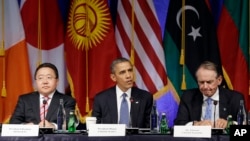“We’re seeing new and fragile democracies cracking down on civil society,” said President Barack Obama in unveiling his Stand4CivilSociety agenda on September 23, 2013 in New York. The President convened leaders on the margins of the United Nations General Assembly to discuss this issue at an event that included high-level representatives from over two dozen governments, representatives of civil society, and the heads of major foundations.
The event launched a year of coordinated international efforts to push back against a growing crackdown on civil society organizations worldwide. As part of a joint statement, participants pledged to work together through a variety of initiatives over the next 12 months to create a better environment for civil society.
The “Lifeline: Embattled Civil Society Organizations Assistance Fund” launched in July 2011, and has already provided support to 218 civil society organizations (CSOs) operating in sixty-four countries. The current donor group consists of seventeen countries, including the United States; and two foundations.
Acting Assistant Secretary of State for Democracy, Human Rights, and Labor Uzra Zeya, said the fund is essential to the work of civil society:
“Lifeline provides emergency support, so activists can continue their work. For instance, very modest small grants allow activists to take care of their own security, to take measures to protect themselves online, in some cases to relocate themselves in the country, so most importantly, they can carry out their vital work.”
In addition to working through Lifeline, participants at the Stand4CivilSociety event committed to developing new, innovative ways to provide financial, logistical, and technical support to strengthen civil society organizations. These actions will be part of a broader, coordinated effort to create space for civil society in countries around the world.
The United States and other governments participating in the meeting agreed to reconvene at the UN General Assembly next year to review ongoing efforts to address this issue within the Open Government Partnership, the Community of Democracies, Lifeline, and related programs. Leaders hope to create an international environment in which civil society is no longer under siege but thriving.
The event launched a year of coordinated international efforts to push back against a growing crackdown on civil society organizations worldwide. As part of a joint statement, participants pledged to work together through a variety of initiatives over the next 12 months to create a better environment for civil society.
The “Lifeline: Embattled Civil Society Organizations Assistance Fund” launched in July 2011, and has already provided support to 218 civil society organizations (CSOs) operating in sixty-four countries. The current donor group consists of seventeen countries, including the United States; and two foundations.
Acting Assistant Secretary of State for Democracy, Human Rights, and Labor Uzra Zeya, said the fund is essential to the work of civil society:
“Lifeline provides emergency support, so activists can continue their work. For instance, very modest small grants allow activists to take care of their own security, to take measures to protect themselves online, in some cases to relocate themselves in the country, so most importantly, they can carry out their vital work.”
In addition to working through Lifeline, participants at the Stand4CivilSociety event committed to developing new, innovative ways to provide financial, logistical, and technical support to strengthen civil society organizations. These actions will be part of a broader, coordinated effort to create space for civil society in countries around the world.
The United States and other governments participating in the meeting agreed to reconvene at the UN General Assembly next year to review ongoing efforts to address this issue within the Open Government Partnership, the Community of Democracies, Lifeline, and related programs. Leaders hope to create an international environment in which civil society is no longer under siege but thriving.






